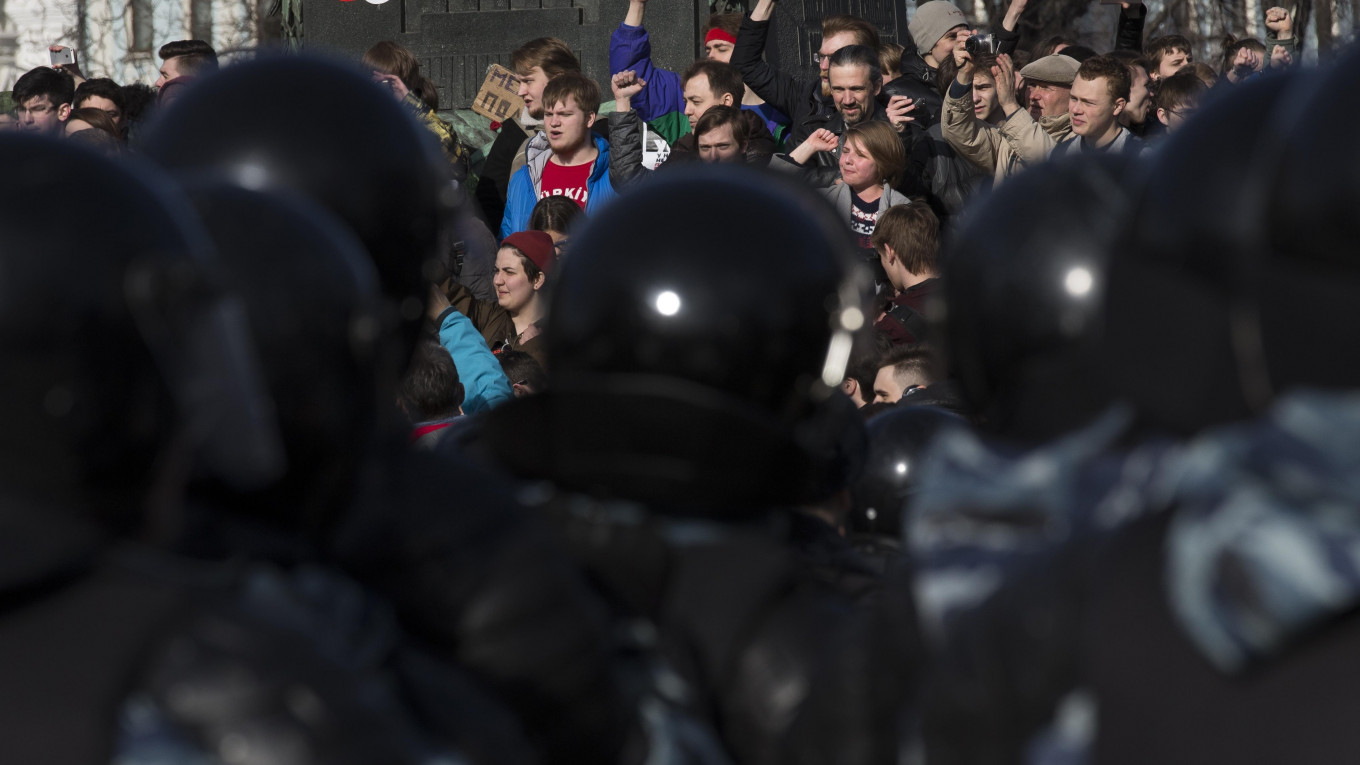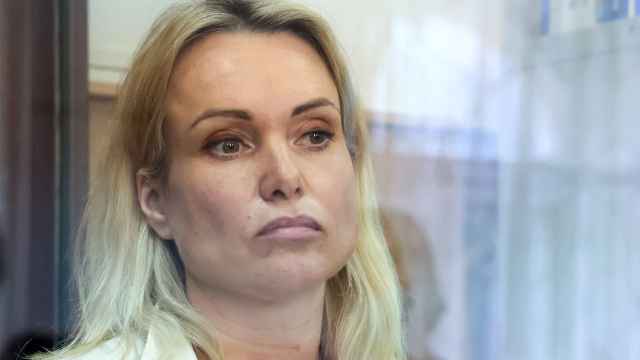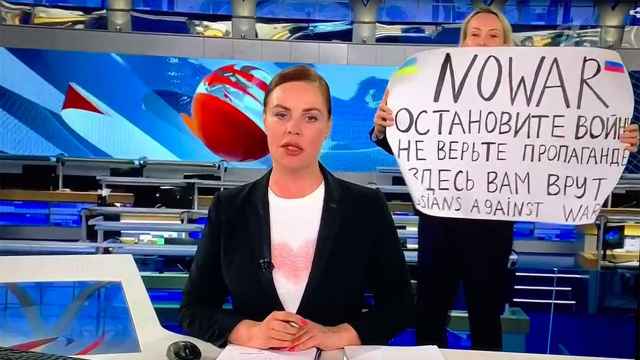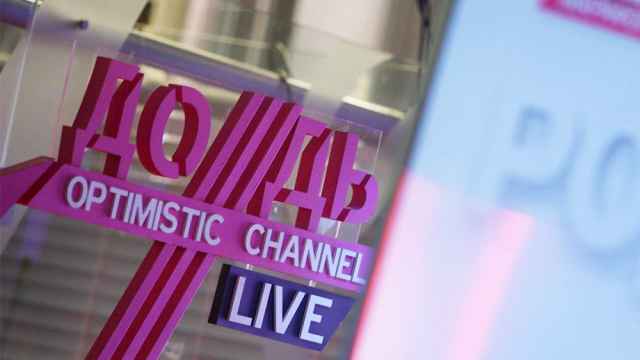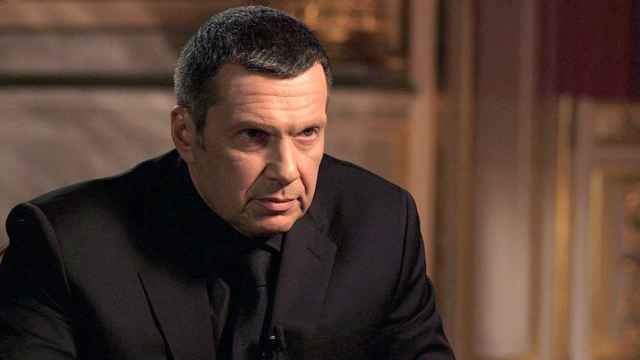Last Sunday, protests on a scale not seen since 2012 shook Moscow, St. Petersburg, and about 90 other Russian cities and towns — even in areas traditionally thought of as Putin’s stronghold, where his approval and his party’s ratings are in the high 90s.
Several thousand people — no less than 8,000 in Moscow alone — came out to protest government corruption, despite warnings that they could be arrested. For these demonstrators, the personification of government corruption has become Prime Minister Dmitry Medvedev, the country’s unassuming former president, whom firebrand opposition leader Alexei Navalny targeted earlier this month in a damning investigation.
You might say that 60,000 Russians protesting across a country populated by 144 million people is just a drop in the ocean. Nevertheless, these were the largest political demonstrations in more than five years. Attendance was especially impressive, if you consider the fact that many of these protests — including the rally in Moscow — were banned by local authorities. In many cases, employers, schools, and police actively discouraged people from attending the demonstrations, and sometimes even threatened them with violence, expulsion, or unemployment.
Sunday’s protests certainly deserved more attention than they got from the Russian state media, which instead reported on such trivialities as an American “freedom-loving cow” that ran from police officers in a “dramatic chase.”
Admittedly, there was one Russian state-owned media outlet, RT, that did indeed cover the demonstrations in Moscow, but RT is a foreign-language propaganda network, and its coverage isn’t intended for domestic audiences. Predictably, the TV station tried to cast the protesters as little more than “opposition activists” who brought guns to the rally and injured a police officer.
You’ll be shocked to learn that the victim is the same riot cop who was supposedly injured at a protest in 2012, and later awarded a free apartment for his selfless service.
One hell of a gag order
For the most part, however, Russia’s state media — especially the national television networks, which wield powerful influence over public opinion — remained silent about Sunday’s nationwide demonstrations for three days straight.
In an interview with the independent TV channel Dozhd (one of the few stations that has reported on the rallies), prominent television critic Arina Borodina explained that a gag order of such magnitude could only have come from the very top, namely the Putin administration.
It’s long been an open secret that Putin’s close circle directly — and quite unconstitutionally — intervenes in the media. Leaked emails show that the current deputy chief of Putin’s staff, Alexei Gromov, pitched not only story ideas and angles, but submitted entire articles for publication in loyalist outlets, which obliged unquestioningly.
Still, even in this atmosphere, the 2011 and 2012 protests were covered extensively by the state media.
Borodina told Dozhd that this week’s radio silence was unprecedented. What would a typical Russian TV viewer think, she asked, if they were shown Pushkin Square in Moscow — one of the city’s instantly recognizable landmarks — suddenly filled with thousands of protesters? How could it be happening, if Putin’s popular support is so overwhelming and the so-called “opposition” is just a bunch of Western-funded marginal troublemakers?
This startling imagery couldn’t be explained without upending the state media’s traditional narrative, and that’s almost certainly why the Kremlin ordered its reporters to shut up, while hoping the public’s outrage would wither quietly, as it has before.
But it didn’t, and the public’s demand for news about the protests has been undeniable, allowing Russia’s few remaining independent media outlets to attract a week’s worth of traffic by covering in detail the demonstrations, the arrests, and the subsequent courtroom drama.
Good luck with all that silence
One of these independent news sites, Latvian-based Meduza, had almost a million unique visitors the day after Sunday’s protests — more than double the traffic of a typically busy news day. Ilya Krasilshik, Meduza’s publisher, told The Moscow Times that his website owed its success to a combination of unexpected interest in the demonstrations and an almost complete lack of competition among other news outlets. “Most outlets were either unprepared to cover the protests or were prevented from doing so,” Krasilshik said.
Also filling the reporting void was another enormously enthusiastic group: Russian video bloggers. Scores of teenagers and very young adults who have made names for themselves on YouTube eating lemons and playing video games suddenly turned political. These folks, fluent in memes and Internet subculture, are playing on a level where the state’s wrinkled propagandists can’t even hope to compete.
Russia’s most popular TV news show, “News of the Week,” hosted by Dmitry Kiselyov, typically draws about 300,000 views per episode on YouTube. Compare that to the 1.5 million views video blogger “SOBOLEV” attracted in one day with a clip explaining Sunday’s protests to his 2.5 million followers (almost four times the number of YouTube users subscribed to the entire Rossiya channel).
By the end of day two, even some state media outlets realized that ignoring Sunday’s demonstrations was no longer viable. For example, the morning show on the state-owned radio station Vesti FM and Rossiya’s political talk show “This Evening With Vladimir Solovyov” broke their silence, finally discussing the protests in completely predictable propagandistic terms.
Every host and guest went out of their way to blame the protesters for taking part in an “unsanctioned” rally and “exploiting” Russia’s kids. They pointed out the West’s hypocrisy in condemning the heavy-handed police response, claiming that U.S. police would have “shot them on the spot.”
Return of the Uncle Sam the Bogeyman
Yes, the Wicked West has returned as Russian television’s bogeyman, and the country’s very sovereignty is again at stake. In particular, one guest on Solovyov’s show warned that the U.S. is using corruption “as a ruse” to foment unrest in Moscow — just as Washington did in Kiev.
As a new protest movement finds legs in Russia, the nation’s state media seems intent on keeping the news focus on Ukraine’s civic unrest, presumably trying to convey the message that political opposition risks the collapse witnessed in Kiev in 2014.
A day after Sunday’s demonstrations, a guest on “Studio One,” a flagship talk show on the state-owned TV network Channel One, complained that there are more pressing matters to discuss on Russian television than Ukraine’s continued protests. The entire studio audience literally shouted him down.
“We will discuss Ukraine every single day because it’s an example,” explained Artyom Sheinin, the show’s brutish, gung-ho ex-military host. “And we will bring it up until loudmouths like you understand where you are leading the country with your talk about ‘corruption.’”
A Message from The Moscow Times:
Dear readers,
We are facing unprecedented challenges. Russia's Prosecutor General's Office has designated The Moscow Times as an "undesirable" organization, criminalizing our work and putting our staff at risk of prosecution. This follows our earlier unjust labeling as a "foreign agent."
These actions are direct attempts to silence independent journalism in Russia. The authorities claim our work "discredits the decisions of the Russian leadership." We see things differently: we strive to provide accurate, unbiased reporting on Russia.
We, the journalists of The Moscow Times, refuse to be silenced. But to continue our work, we need your help.
Your support, no matter how small, makes a world of difference. If you can, please support us monthly starting from just $2. It's quick to set up, and every contribution makes a significant impact.
By supporting The Moscow Times, you're defending open, independent journalism in the face of repression. Thank you for standing with us.
Remind me later.



